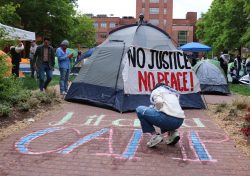A Georgetown University Student Organization official resigned her post Tuesday. Hannah Powell (SFS ‘05), the former New South Project Manager, said that she could no longer work with the GUSA executives after being harassed during the interview process for the University’s board of directors last April.
“If I can’t stand behind someone, I don’t really want to work for them,” Powell said.
According to Powell, GUSA assembly members present at her 50-minute interview asked her a series of pointed questions on Georgetown’s Catholic identity. Powell was never specifically asked about her own religion, but she said she was put into a position in which she felt that she had to reveal that she is not Catholic.
In her letter of resignation, Powell wrote that her interview was “partial and discriminatory,” also noting disappointment that one of the candidates chosen was GUSA President Brian Morgenstern’s (CAS 005) campaign manager, Mike Glick (CAS ‘05). According to Powell, both candidates appointed by Morgenstern come from similar backgrounds and community experience, both having involvement with the Advisory Neighborhood Commission. Powell said that more diverse representatives could better serve the students.
Although Morgenstern said that it would have “been nice” to include more diverse representatives on the board, it was more important for him to select the most qualified candidate.
“The position we were looking at would have to deal with university relations with the community and neighborhood issues. Glick was really well-qualified, and I had the utmost confidence in his ability,” Morgenstern said. “I appointed him because he was the best qualified.”
In addition to Powell, Glick, Eric Lashner (CAS ‘05), and Nazareth Haysbert (SFS ‘05) also interviewed for the two positions on the board of directors. Each of their interviews took a shorter 30 minutes. Haysbert and Lashner also reported that they were asked questions about their loyalty to GUSA in a hypothetical situation in which their own personal opinion differed from that of the Assembly. Haysbert said that he was asked questions that were unnecessary, but not disrespectful. Glick reported that his questions were more geared towards challenges and plans for the University’s future.
“I thought they were going for someone who would be the best fit for them,” said Haysbert. “They were looking for someone who would fit into their group.”
After the interview process, GUSA President Brian Morgenstern appointed Glick and Lashner, who are both Jewish, to the two posts. The interviewing board consisted of the chair of the Georgetown Program board, one assembly member from each class, and one member from each of the five funding boards in addition to the members.
“Some of the interviewers were harsher on Hannah than on the other candidates. There were some who had paid close attention to decisions she had made as SAC Commissioner and as a result asked questions of her that she felt were unfair,” said Morgenstern. “I was upset at the way she was treated, but in the end I had to make a decision as to who the most qualified candidates were.”
Jack Ternan (CAS ‘04), senior class representative and assembly chair, attended the appointment interviews and said that he tailored his questions for each candidate based on what he most wanted to know about each person. To gauge “consistency” and aptitude for the job, Ternan specifically asked Powell about her role as a SAC commissioner and Georgetown’s Catholic identity. Ternan said that Morgenstern’s decision ultimately came down to qualifications.
Powell’s resignation leaves empty the role of New South Project Manager, which will likely remain unappointed.
According to Morgenstern, former Vice President for Student Affairs Dr. Juan Gonzalez advised him against delegating power with regards to the New South space.
Morgenstern indicated that he would probably take over the role of Powell’s former post in order to exert a greater say over the delegation of this space because of its large potential for student impact and presidential legacy.




